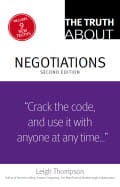Start of Main Content
Negotiation Tips: Lies, damned lies and negotiations
Untruths hurt your reputation and put future negotiation at risk
Prof. Leigh Thompson
The most commonly uttered phrase in any negotiation is, "This is my final offer."About 90 percent of the time, this statement is completely untrue. Most negotiators who claim that they are making their best and final offer are, in fact, not at their real reservation point — or their true walk-away. Rather, they are trying to scare the other negotiator into agreeing to their terms.
By technical definition, negotiators who claim an offer is final but know it is not are lying. A lie occurs when a negotiator makes a knowing misrepresentation of a material fact.
Lying is considered to be among the worst sins a person can commit — in most contexts. Then there is the negotiation arena where many people shed their ethical skins, prepare for battle, and don't think twice about uttering phrases such as, "This is my final offer" or, "I have a better offer" when, in fact, they don't.
Are there any problems with lying in negotiation? You betcha. So let's outline a plan for how to gain momentum in a negotiation without throwing ethics out the window.
Why is this important to do? Well, for starters, your reputation is at stake. A negotiator's reputation is a precious resource that once scarred or marred can create an avalanche of undesirable outcomes.
For example, in one investigation, negotiators were classified as liars, tough-but-fair or cream puffs, based upon the reputations they earned over a semester term. When people negotiated with liars, they were much more likely to use aggressive, tough strategies. It was far better to have a reputation as being tough-but-fair.
"What, me? I have nothing to worry about." If you think your reputation is clean, think again. In our research, we examined negotiators over a 10-week period and then asked them anonymously to indicate how much of the time they felt they were deceived, misled or lied to by others. The average was a little more than 40 percent of the time.
Then we turned the tables and asked negotiators how much of the time they misled, deceived or lied to others. The statistic was less than half — about 20 percent. This statistic reveals a double standard. Namely, we see ourselves much more favorably than others see us. Think of this as a negotiation 360!
So what to do? Certainly, we are not suggesting that you reveal sensitive information in negotiation. Rather, we are suggesting you follow these three simple principles:
- Negotiators are under no obligation to truthfully reveal information. If you are asked intrusive questions, say that for strategic reasons you are not ready to discuss that and then turn the conversation back to your interests and what you hope to gain.
- If you are tempted to lie about having outside options that you don't have, express your opinion, your optimism, and your opportunities.
- Rather than saying, "This is my final offer" — which often has the effect of creating a bargaining stand-off — make more offers that contain smaller concessions. Keep the momentum going but leave yourself room to move.
For more on improving your negotiation chops, see Prof. Leigh Thompson's The Truth About Negotiations

